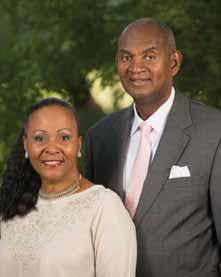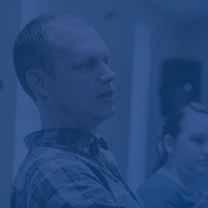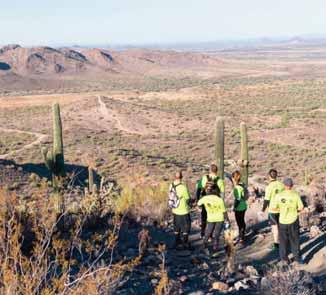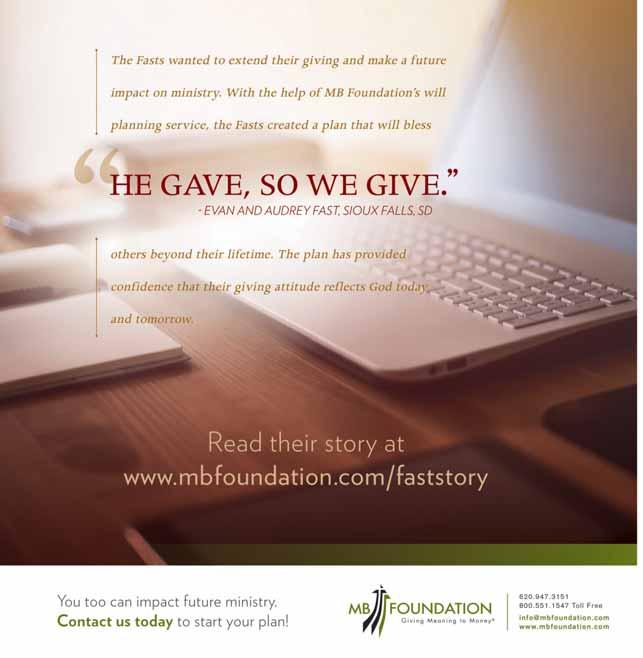HRISTIAN EADER
November / December 2017
Waiting for peacePage 12
Hiking to connect with neighborsPage 20
A credible place for donatingPage 31




The magazine of U.S. Mennonite Brethren













November / December 2017
Waiting for peacePage 12
Hiking to connect with neighborsPage 20
A credible place for donatingPage 31




The magazine of U.S. Mennonite Brethren












Phillips Brooks was worn out. After guiding his congregation through the bloody years of the American Civil War and delivering a powerful message at President Abraham Lincoln’s funeral, Brooks needed a break from his duties at Church of the Advent in Philadelphia. His congregation graciously gave Brooks a year-long sabbatical with pay, and the 30-year-old pastor spent much of that year traveling. On the evening before Christmas Day 1865, Brooks found himself on horseback, riding from Jerusalem to Bethlehem.
As he rode, Brooks studied the fields and quiet streets of Bethlehem and imagined them almost unchanged since biblical times. Brooks said later he felt as if he was surrounded by the spirit of that first Christmas. The fivehour worship service he attended that Christmas Eve at the Church of the Nativity, during which the “whole church was ringing hour after hour with the splendid hymns of praise to God,” invigorated the exhausted pastor. He later told his family and friends that his experience in Bethlehem was so overpowering that it would forever be “singing in my soul.”
The visit prompted Brooks to pen the poem, “O Little Town of Bethlehem,” which was set to music in 1868. The first stanza of this carol describes Jesus as an everlasting light that illuminates the world’s dark streets, addressing both our hopes and our fears. Given the violence of a civil war and recent presidential assassination, Brooks certainly understood darkness and fear. And yet because of Bethlehem’s child, Brooks confidently offered hope to those who had “dared not dream of it before,” as he writes in a later Christmas poem, “The Voice of the Christ Child.”
We too know fear. Some of us are better acquainted with it than others. My friend Sara has lived a remarkably adventurous life, given that anxiety is her frequent companion. “Some people hoard things,” she explains. “I hoard worry and fear.” Not willing to let fear occupy every corner of her mind, Sara daily reminds herself to leave her worries at the feet of Jesus.
In Matthew 6, Jesus recognizes our tendency to accumulate worries and fears, and he offers a surprising instruction: “Seek first your heavenly Father’s kingdom and his righteousness, and all these things—what you’ll eat, drink and wear—will be given to you” (my paraphrase). While seeking after God is not a one-size-fits-all endeavor, we are nevertheless each called to live out this command. As we enter the Advent season, I recognize that there are certainly things to fear—fires, floods, earthquakes, hurricanes and shootings. My prayer is that our fears will recede as we prioritize our commitment to pursue God’s kingdom.

Faber has served as editor of Christian Leader since 2004. She and her husband, David, are members of Ebenfeld MB Church, Hillsboro, Kan.
Vol. 80, No. 6 November /December 2017
Connie Faber EDITOR
Janae Rempel ASSISTANT EDITOR
Plett GRAPHIC DESIGNER
The Christian Leader (ISSN 0009-5149) is a gathering place for the people, passions and mission of U.S Mennonite Brethren. The Christian Leader is published bimonthly by the U.S. Conference of Mennonite Brethren Churches. However, the opinions expressed here are not necessarily those of the church as a whole.
COPYRIGHT: The articles printed in the Christian Leader are owned by the CL or by the author and may not be reprinted without permission. Unless noted, Scripture quotations are from the New International Version.
READER PARTICIPATION: Letters to the editor should be 300 words or less and on one subject. Letters must be signed and include the writer’s city and state. Letters will be edited for clarity, appropriateness and length. Letters will be published, as space allows, unless marked, “Not for publication.”
Freelance article submissions are welcome; a SASE must accompany articles.
SUBSCRIPTIONS: $10 for six issues and $20 for 12 issues ($15, $30 in Canada; all other countries $25 for six issues); $1.50 per copy
CORRESPONDENCE: All correspondence, including subscription questions and address updates, should be addressed to Christian Leader
Box 155, 107 N. Main Hillsboro, KS 67063-0155
Phone: 620.947.5543 Email: editor@usmb.org
MEMBERSHIP: The Christian Leader is a member of the Evangelical Press Association and Meetinghouse, an association of Mennonite and Brethren in Christ editors.
POSTMASTER: Send address changes to Christian Leader, Box 155, Hillsboro, KS 67063. Periodicals postage paid at Hillsboro, Kansas.

U.S.
USMB is encouraging individuals to support U.S. Mennonite Brethren initiatives with an online donation on Giving Tuesday, Nov. 28. Giving Tuesday, the Tuesday following Thanksgiving, is a day to inspire generosity. This will be the fourth year USMB has participated, and funds raised this year will be used to serve pastors and congregations by providing LEAD One events, LEAD Cohorts, LEAD Consults and LEAD Coaching as well as to fund current church plants, says Don Morris, USMB national director.

“Funds given on Giving Tuesday will be used for the expanding mission and ministry of USMB,” Morris says. “This includes providing significant training and resourcing for MB pastors and churches, partnering with our districts and C2C U.S. to help plant more MB churches, providing trained coaches for life-on-life coaching for our pastors and connecting our pastors and churches through various networking opportunities. We plan to do much more in 2018, and this will help give us the financial platform to do just that.”
For more information, visit www.usmb.org/GivingTuesday or use #Together when posting on Facebook and Twitter. –USMB
Delegates from the seven churches of the North Carolina Mennonite

Brethren District (NCDC) gathered for their 76th convention Sept. 15-17, 2017, at The Life Center in Lenoir, N.C. Also present were three people from Grace and Peace Church in Knoxville, Tenn., a church that is considering joining the NCDC. The convention theme was, “Every member matters.”
Friday began with a district pastors’ and leaders’ meeting, which included messages from USMB National Director Don Morris and MB Foundation President Jon Wiebe. The convention started that evening with a youth night.
Following a praise and worship time on Saturday, representatives from each member church gave an oral report from the previous year. Financial reports were given by treasurer Tyrone Sturgis and district minister Terry Hunt A variety of workshops were offered following the reports, and Hunt took 10 guests on a tour of churches in the district.
On Sunday, The Life Center choir led the more than 100 attendees in praise and worship. Evangelist R.V. Brown from Tampa, Fla., spoke about the need to spread the gospel. An invitation was given for people to rededicate to being ambassadors for Christ. Two people indicated they were seeking a relationship with Jesus for the first time. The service ended with communion. “What a beautiful
way to end a weekend of celebration, taking part in the Lord’s Supper,” Hunt says. —CL
USMB launched a new website in September that is intended to serve as an information hub for U.S. Mennonite Brethren.
“We wanted a one-stop-shop for all things MB,” says Don Morris, USMB national director. “I think we’ve done that.”
The new website (www.usmb.org) is the second facet of a branding initiative that began in May with the unveiling of the new USMB logo, which reflects USMB’s commitment to church multiplication and evangelism, intentional disciple-making and leadership development.
The site includes a news section, a place for online donations, an interactive U.S. map showing the five USMB districts and a sortable resource library. A job opportunities module and forum section are still being developed.
The new, brighter color palette incorporates the color scheme of the USMB logo and lends a cutting-edge look to the website. Layout is clean and interactive. Dropdown menus provide easy access to a variety of cat-
egories, and pages load quickly. These elements combine to create a clean, visually-pleasing and easily navigable experience for users.
USMB worked with Friesen Design, Enid, Okla., to develop the new USMB website as well as a website (www.christianleadermag.com) for Christian Leader, the USMB bimonthly magazine.
The new CL site makes better use of photographs and dynamic components, creating a stylish and professional appearance. Navigation is improved by easily distinguishable headlines and dropdown menus. Trending stories scroll across the top of the page.
C-Link news stories are featured at the top of the CL home page, with new articles posted every two weeks. The home page also highlights the content of the most recent print magazine and is organized by department: feature articles, Body Life news articles and essays and columns.— USMB
MB Foundation hosted its second national gathering for senior adults Sept. 29-Oct. 1, 2017, at the Renaissance Hotel in Denver, Colo., with 240 seniors from 13 states and one Canadian Province in attendance. The theme for Celebrate 2017 was “Anchoring our Faith.”
Guest speaker Brian Myers, a graduate of Trinity Evangelical Divinity School and pastor of 30 years, proclaimed a message of hope in the Lord and his Word in a world where the foundations of faith are crumbling and suffering abounds.
Four workshops offered encouragement and insight into how an anchored faith impacts attitudes, relationships, marriages and stewardship of God’s resources.
Ventriloquist Greg Claassen and musical guests, The Ball Brothers, provided entertainment.
“Celebrate 2017 was a vivid

reminder (that) God calls people of faith into a family of faith,” says retired USMB pastor and Celebrate 2017 attendee Paul Klassen. “For the majority of attendees, this event was a family reunion where people reconnected with friends from the past. For others who are newer to the MB family of faith, this was an opportunity to build new friendships.”—MBF
Enrollment numbers have reached record highs at Fresno Pacific University and Tabor College, the Mennonite Brethren colleges in Fresno, Calif., and Hillsboro, Kan.
FPU has 4,029 students enrolled in traditional undergraduate and graduate programs, including Fresno Pacific Biblical Seminary. That number, which exceeds 4,000 for the first time, includes students attending class on the main campus in Southeast Fresno and four regional campuses.
The increase of 509 students from the 2016-2017 enrollment of 3,520 is the largest one-year rise in more than 20 years. Enrollment is increased in degree completion, graduate programs and at the seminary and down slightly among traditional undergraduates. Tabor College also has the largest enrollment in school history at 770 students for the 2017 fall semester. The
number, which includes the Hillsboro campus, online students and high school students earning dual credit, has increased by 43 students from last fall. More first-time freshmen are enrolled this year, a statistic cited as promising for continued growth in the future.—FPU, TC
The U.S. Mennonite Brethren biennial gathering will be held July 24-28, 2018, in Salt Lake City, Utah. The Pastors’ Conference is scheduled for July 24-26, with the National Convention slated for July 26-28. Both events will focus on the theme “Celebrating our diversity and unity” and will feature a variety of speakers from across the USMB family.
Speakers will include:
• Eric Nelson, pastor at South Mountain Community Church Lehi (Utah) Campus;
• Boris Borisov, church plant pastor at Pacific Keep Church, Spokane, Wash.;
• Winnie Bartel, church leader from Shafter (Calif.) MB Church, and USMB representative to the National Association of Evangelicals;
• Brent Warkentin, lead pastor of First MB Church, Wichita, Kan., and MB Mission board chair;
• David Yirdaw, church plant pastor at Avenue Church, a new daughter church of Ethiopian Evangelical
Church, Aurora, Colo.;
• Terry Hunt, lead pastor at The Life Center, Lenoir, N.C., and North Carolina district minister;
• Aaron Hernandez, lead pastor at Grace Point Grulla and Grace Point McAllen churches, La Grulla and McAllen, Texas, and LAMB district minister; and
• Don Morris, USMB national director.
The convention will be held at the University Guest House and Conference Center at the University of Utah. More information can be found at www.usmb.org. —USMB



Why is identifying a mosquito’s species important in your anti-malaria work?
There are about a thousand species of mosquitoes in Africa, but only a few are capable of transmitting the parasite that causes human malaria. I’m one of a very small group of people worldwide who can identify mosquitoes from Africa.
Don’t we already have effective ways to prevent malaria?
From his lab and office at the University of California’s Kearney Agricultural Research Center, Anthony Cornel of Reedley (Calif.) MB Church travels frequently to Africa. His mission: to alleviate suffering caused by malaria. Cornel, who has a doctorate in Zoology/ Entomology from the University of Witwatersrand, South Africa, took a few minutes away from his microscope identifying mosquito species from Cameroon to talk about his work.
males carrying these transgenes which would mate with females in the wild. The gene could eventually spread to the whole population. So instead of eliminating mosquitoes, we would just replace them with ones who cannot carry the disease.
Does this approach really work?
Mennonite Disaster Service (MDS) is responding to hurricane damage in Texas, Florida and Puerto Rico while Mennonite Central Committee (MCC) is juggling eight major relief projects. In addition to recent earthquakes in Mexico and Central America, hurricanes in the Caribbean and flooding in South Asia, MCC is responding to three situations that are impacting the global Mennonite Brethren family: violence in Ukraine and the Democratic Republic of Congo and flooding in Peru. Funds are stretched thin for both of these interMennonite relief agencies, and they are requesting donations. To donate, visit www.mds. mennonite.net and www.mcc.org.—MCC, MDS

Treated bed nets and spraying are becoming less effective as mosquitoes develop resistance to the insecticides. The malaria parasite itself is becoming resistant to the treatments we use. We have to look at alternative methods.
What new technologies are researchers using?
Our team includes DNA jockeys who are experts with manipulating a mosquito’s genome so that instead of spreading malaria, it actually expresses proteins that kill the parasite in the mosquito’s body.
How would you use genetically modified mosquitoes? We would release the modified
The technology to create those mosquitoes is here. Right now we are looking for an island off the coast of Africa that has a small population of malaria-carrying mosquitoes to do our field test. Once we find the site, we have to bring some of those mosquitoes to our lab, colonize them and modify them. Within the next four and one-half years we hope to have data proving this technology can or cannot work.
How do you respond to people who question an approach that involves genetic modification?
We do our best to explain that our work is just a tiny part of the genome that affects the mosquito. We’re not creating something that is going to jump across species, but something that will stay within that particular species.
InterviewbyKathyHeinrichsWiest
Discipleship requires persistence, restores relationships
Neighbors living around our church are always coming and going. Many move into our community as a first stop for their migrant families this side of the border. Other families move in, only to try and move their kids away to what they hope will be better homes and schools. We have worked with some students for years, only for them to abruptly leave us, never to be seen again. Ministry here reflects our larger changing world, and while this can seem a challenging environment, it has also taught me the rewards of being faithful to the work God has given us.
To disciple someone takes commitment. Sometimes, after months or years of thinking we have lost contact with some student or family, we find them again living in another part of the neighborhood, and we are able to reconnect. This happened recently with a girl we met when she was 7. We had lost contact and then met her again as a 10-year-old.
She is now a vital part of our weekly children’s and youth programs and has brought her entire family with her to church. While it is true that it takes a certain sense of initiative and mission to be there to reach a child with the gospel the first time, it takes the Spirit teaching us patience and the importance of faithfulness in order for us to be there years later to find and receive that same young person again.
By moving intentionally into a neighborhood, in our case literally across the street from our church facilities, we can seek to show our ever-changing community that we are committed to being with them and growing with them. This means watching families grow. One of our neighborhood families includes a pair
of brothers who live with their mother in a nearby apartment complex where we pick up children for church every week. For a time, these brothers were coming to church frequently. The women of our church even hosted a baby shower for their mother to welcome their baby sister.
However, as they grew and got more involved with sports and other activities, we saw less and less of the boys. In fact, these growing adolescents began showing animosity toward our church and would mock church volunteers as we went into their apartment complex each week. They had a negative influence on many younger church members, discouraging them from attending. For a time, the brothers’ behavior was very disruptive when we tried to do neighborhood work. We prayed for the situation and continued to show love and kindness to these brothers until we stopped seeing them altogether.
But then, five years after that baby shower and one year after the worst of our encounters with these young men, their little sister began coming to church. So, although the boys are not active in our church, our persistence with this family has enabled us to continue having a positive influence in their home and has prompted an opportunity for reconciliation. This relationship is continuing to blossom and has brought another child to a safe and welcoming place where she can learn about Jesus.
Whether we call such kingdom work evangelism or discipleship, one thing is clear: it stretches us to grow in faithfulness to God and our neighbors. In God’s good plan, who knows what hosting a baby shower today could grow into five years from now?◗

Delilah and Brad Isaak have served the Selma (Calif.) MB Church church plant since it was launched in 2010. Delilah is an elementary school teacher in Sanger, Calif., and Brad is a youth pastor at Selma MB and a student at Fresno Pacific Biblical Seminary in Fresno, Calif. Delilah is also one of the newest members of the USMB Leadership Board.
Church planting requires specific competencies
Church planting is difficult for the most qualified pastors and nearly impossible for those unqualified. If church-planting pastors do not have the essential tools for the job, they will frustrate themselves and everyone around them. Our desire is to equip and encourage pastors and their families to lead in a way that magnifies the gospel in every area of their lives. Every endeavor requires a set of fundamental skills necessary to accomplish the task with excellence. For instance, the competencies of a successful basketball player are consistent. They can all dribble, shoot, pass, play defense, rebound, play as a team, think and move quickly. They are coachable and competitive. They don’t have to exercise all of these competencies at the same level, but all of these qualities characterize a successful player at the highest level.
Church planters similarly have qualities or competencies that determine their God-given capacity to plant a reproducing church. A competency is the dynamic interplay of knowledge, understanding, skills, values, attitudes and passion. For instance, a church planter may have the necessary knowledge, understanding and skill to communicate the gospel but they may not demonstrate an attitude of joy and passion to reach the unchurched. Others may have the right passion and values of the gospel in their lives but cannot communicate the elements of the gospel effectively or lead a team of people. All dimensions of a church planter are es-
sential to ensure that an effective gospel-centered, Spirit-led, missionfocused church plant has the viability to survive.
One of the greatest responsibilities of C2C and USMB, as we partner together for church planting, is the careful and prayerful evaluation of potential church planters. The motivation for a formal church planter assessment is three-fold:
For the glory of God. God is glorified with the multiplication of his bride, the church. We strongly desire church planters who are much more interested in the glory of God than their own glory.
For the multiplication of disciples. The goal of church planting is not just to add churches but also to multiply disciples. We look for church planters who are passionately committed to model disciple-making and to equip others to make disciples.
For the health of the church planter and the church planter’s family. The assessment is not just to determine if they can plant a church but if it is the best thing for their family at this time. Pastoring a church shines a light on a person’s spiritual, emotional and relational maturity or lack thereof. We strongly encourage planter candidates to walk in the light (1 John 1:5-10) as much as possible during the assessment in order for a true evaluation to occur for the health of the planter. Transparency throughout the assessment process is critical for receiving an accurate assessment of their competencies.◗

Scott Thomas is the director of C2C U.S. He has served more than 35 years as a lead church planter and church re-planter and as a board member of three international church planting networks. This article is adapted from a portion of the C2C Assessment Manual called “Discerning the Call.” Thomas is also the author of Gospel Coach: Shepherding Leaders to Glorify God, published by Zondervan in 2012. He and his wife, Jeannie, live in Nashville, Tenn.
“TO Peggy from Santa Claus.” I carefully removed the homemade tag from the package. Out tumbled a yellow-haired, red-cheeked rag doll with gangly legs. Not exactly what I was hoping for. The expectant look on my mother’s face made me want to cringe. “Do you like her? Do you like her?” I loved my mother dearly. I lied. “Yes, she is very nice.”
“Mother, someone told me you have to be a Christian to celebrate Christmas. Is that true?”
“Oh, no, honey, that’s not true. Don’t worry about it. It’s just a fairy tale.”
The fury on my father’s face. A purplish cast to his complexion. A hard line for a mouth. The heavy sound as he strode down the linoleum hall into our living room. Closer, closer. The tree had just gone up the night before. A beauty to behold. Glistening silver tinsel, glowing red-gold bulbs, sparkling lights. It was a testament to my mother’s artistry…yet frail, short-lived. The sound, the crashing sound, as he lifted-up the tree and threw it against the wall. Shattering glass. Slamming door. He was gone. It was Christmas.


“Peggy.”
Unmistakable. It was my father’s voice, across the miles. “Peggy, I did what your mother wanted. I accepted Jesus. I got my fire insurance. And Peggy, I want you all to come home for Christmas. I want us all to be together. Get permission from Gaylord’s church. Come home.”
Silence, waiting. “And Peggy Anne, I love you.”
The enemy was too aggressive. The cancer was too strong. In 10 days, my daddy met Jesus face-to-face. I was home for Christmas. I was home for a funeral, for a burial. I could not find his coffin. I could not recognize him. Then I knew. I was home for a resurrection, a celebration of new life. “When we all get to heaven…”




By Peggy Goertzen

My youngest was barely a year old. As we drove, I was sewing red taffeta Christmas doves, gifts of love for my family. The rain on the windshield was light, matching the light grey of the sky overhead. Strains of Erica’s flute piece danced in my head from her recitation the night before.
The scissors slipped from my hand.
Bracing myself, back, forth, over, under, upside down.
“Oh, no. No, no!”
The noise was deafening. Then nothing. Our van lay on its side. My glasses are gone but I see Gaylord’s arm dangling above me, motionless.
“Gaylord? Gaylord!”
A stranger’s voice: “Undo your seat belt, ma’am. We can’t get you out.”
Blackness. My arm won’t work.
“What is that red color?”
“It’s your blood.”
My head. My face. I can’t breathe.
An ambulance worker: “Hurry, we’re losing her.”
Institutional white—white walls, people dressed in white.
“Where am I?”
“You’re in the hospital.”
Cutting, stitching.
“Where is Gaylord? Where are my kids?”
Separate places…Visalia, Reedley, Dinuba. Christmas morning. The voice of an angel, “May I pray with you?”
Another angel, “May I feed you your Christmas dinner?”
A tentative voice, “Hold still. I am trying to set your arm.”
Why? Why is this happening to me? And on Christmas? This can’t be Christmas. Then the voice of the Lord God himself: “Christmas is Immanuel. God with us. I am with you. I never left you. I will always be with you.”
And it will always be Christmas. God’s presence with me makes it Christmas.
Peggy Goertzen, her husband, Gaylord, and their four young children survived a serious car accident while visiting family in Bakersfield, Calif., on Christmas Eve in 1983. Goertzen, a historian, writer and speaker, is the director and archivist for the Center for MB Studies at Tabor College, Hillsboro, Kan. She and Gaylord, who is retired, have served as the pastoral couple at churches in California, Oklahoma and Kansas. The Goertzens have 15 grandchildren.






Advent reminds us that the world is not right

Iam a winter person. Where most people only see cold and dark, I see cozy sleepy days. Where some people dread, I anticipate. All through the wet spring, the parching hot summer and the dying fall, I wait for the quiet winter to come. To me, winter means peace in a world with little. It means rest in an age where I am coming to doubt its existence. To me, winter means Christmas will soon be here.
Christmas begins with Advent
Anticipating the coming Christ is an important theme in Christianity that is often lost in the commotion and celebration of Christmas. When there are presents to buy and family to see, it can be easy to miss taking time to reflect on what the coming of Christ means. However, such reflection is the reason why it is important to begin the Christmas season with Advent.
Often in our rush to Christmas we do not fully appreciate the season of Advent. Advent is so much more than getting a single, waxy chocolate each day from a box calendar with Disney characters printed on the front.
If Christmas is the coming of a world at peace, of a world made right, and if Christmas is the calm, then Advent is the wailing and the wilderness that the world is today. Advent helps us make sense of the importance of the coming peace. Advent is the time to recognize that the world is not right.
This may seem like an odd thing to remember, come the Christmas season. A holiday with eggnog, lights and carols does not seem like the right time or place to talk about the general faults of the world. However, there is a reason that the season of Advent should not be missed. To know why, we should first talk about John the Baptist.
The importance of the wild prophet
John the Baptist is not the type of man any civilized person would want to be friends with. He lives in the desert on a diet of honey and locusts and loves telling everyone he happens across that they need to repent from their wicked ways. John, to put it bluntly, is a weird guy.
John is, however, very important to God’s plan of salvation seen in Christ. Even before we hear John speak, we know he is going to be important because
By Russell Doerksen
he is a child born of a miracle to elderly parents (Luke 1:5-25). In the Bible whenever there are odd circumstances with a birth, the resulting child is always part of God’s greater plan. In terms of overcoming infertility, think of Isaac, Joseph and Samson and in terms of miraculous birth, think of Jesus.
The importance of John the Baptist in the story of Jesus is seen in his role in Advent. We read in Isaiah 40:3-5: “A voice of one calling: ‘In the desert prepare the way for the Lord; make straight in the wilderness a highway for our God. Every valley shall be raised up, every mountain and hill made low; the rough ground shall become level, the rugged places a plain. And the glory of the Lord will be revealed, and all people will see it together. For the mouth of the Lord has spoken.’”
John quotes this passage in Luke 3 to show his preaching as a fulfilment of prophecy. The time in which John lives is a time of great turmoil for the Jewish people. After a short but particularly unsavory rule by the Greeks, Palestine is under the fist of the Romans. The Jews, including John, lived as oppressed, second class citizens in a region considered by the Romans to be the boondocks of the empireand as such, corruption abounded. To a first century Jew living in Palestine, the world would both seem and in fact be broken; it would have been a rugged, desolate wilderness that needed to be made right.
We can see that the world is not how it should be from other sources of the period outside the Bible as well. This was the opinion of the Zealots, a Jewish religious group at the time who believed that the only way to make things right was to drive Rome out by force. Then, just as today, radical militant groups didn’t form without a reason.
It is into this world—a world so loud, so noisy and so broken that war seemed to be the only way to set things right—that we see the coming of this wild man, John the Baptist, who warns of the coming destruction, preaches repentance from sin, charity and contentment and tells of the one who will come soon to set things right (Luke 3:1-19). In the Gospels, John adds weight to the importance of the work of Christ by showing the reader that the world is broken, and that Christ is the one who will make it right.
The coming kingdom
In Revelation 21:1-4 we read: “Then I saw a new heaven and a new earth, for the first heaven and the first earth had passed away, and there was no longer any sea. I saw the Holy City, the new Jerusalem, coming down out of heaven from God, prepared as a bride beautifully dressed for her husband. And Iheard a loud voice from the throne saying, ‘Now the dwelling of God is among the people, and he will live with them. They will be his people, and God himself will be with them and be their God.
how much work it will take to make things right is lost without the season of Advent. To celebrate Christmas without first reflecting on why we need Christ the Savior is to cheapen the true meaning of Christmas. To celebrate Christmas without Advent is to celebrate the coming of a Savior without ever knowing what we need to be saved from. If you will forgive this rephrasing, peace is only peace if an end has been put to war.
I think we can agree that we live in a noisy preChristmas world. The world is not as it should be
Advent helps us make sense of the importance of the coming peace. Advent is the time to recognize that the world is not right.
He will wipe every tear from their eyes. There will be no more death or mourning or crying or pain, for the old order of things has passed away.”
There are few passages in Scripture that fill us with more comfort and hope than this passage from Revelation. In four verses we are assured that God is at work and will set things right. With Christ will come the peace we long for from the broken world of war and rumors of war in which we live.
Looking forward from this time of uncertainty and pointing to a time and a way in which things will be made right is what John the Baptist did all those years ago. This is why Advent is so important to understanding the true importance of Christmas. It is easy to say that Jesus was born that Christmas morning to set things right, and we are right to say this.
However, the full impact of the statement, the full gravity of just how large the problem is and just
and that should put us on edge. But take heed of the words of John the Baptist from Luke 3:16: “I baptize you with water. But one who is more powerful than I will come, the straps of whose sandals I am not worthy to untie. He will baptize you with the Holy Spirit and fire.”
We live now in a time of Advent, but know that soon peace will come. Soon Christ will return to make new this broken world. Soon it will be Christmas again.
Russell Doerksen is a graduate of Providence Theological Seminary of Otterburne, Manitoba, Canada, and is lead pastor of the Evangelical Mennonite Conference Church in MacGregor, Manitoba. This article was first printed in the December 2015 issue of The Messenger, the publication of the Evangelical Mennonite Conference, a conference of 62 churches averaging 7,700 worshippers in five Canadian provinces ministering in about two dozen countries.

By Cory Seibel

Simeon and Anna are two of my favorite biblical characters we encounter during the Christmas season. These two senior adults appear at the temple as Mary and Joseph come to consecrate the infant Jesus (Luke 2:22-40). Simeon is described as a “righteous and devout” man, led by the Holy Spirit who is actively watching for the coming of the Messiah (vv. 25-26). Anna, we are told, is an elderly widow who “worshiped night and day, fasting and praying” (vv. 36-37). Though they don’t hold a prominent place within the gospel narrative, the biblical text makes it clear that these were remarkable people.
I consider myself blessed to be a pastor serving in a richly multigenerational congregation. Our church is made up of a diverse mix of people of all ages, from infants and toddlers to those in their 80s, 90s and beyond. As I look across our sanctuary on Sunday mornings, I see significant numbers of seniors who could be described in terms similar to how Simeon and Anna are depicted in the gospel. Many of these older
adults have walked with the Lord for decades. They daily seek the Spirit’s guidance and are eager to continue to experience God at work in the world. These are engaged, prayerful followers of Jesus. It is a privilege to be a part of the family of faith together with these models of long-term faithfulness. They too are remarkable people.
Even though these Annas and Simeons exude the vibrancy and joy that comes from life in Christ, I know that many older adults also contend daily with the realities of grief, loss and pain in their lives. Some carry a deep sense of loss due to the death of their spouses and friends. A number grieve the limitations brought on by declining mobility, eyesight, hearing or cognitive capacities. Some struggle to come to terms with how the church has changed over the years and with the sense that they don’t have as much influence as they used to. There are those who grapple with questions about their life’s purpose. In some cases, the deepest sense of grief centers in broken relationships which remain unresolved.
The Christmas season has a way of bringing these struggles with grief and loss freshly to the surface. For many of us, this season is filled with activity, celebration and togetherness. Yet this time of year can also accentuate feelings of loneliness and pain for many seniors. As I interact with the older adults in my church, I recognize that during this season many of them are carrying griefs.
Knowing this, I find that there is great value in intentionally reaching out to older seniors and striving to include them during the holiday season. There are many simple ways to accomplish this. For example, a few families in my church make a point to invite older adults to join them for their Christmas meal each year. A number of the seniors who receive these invitations would otherwise spend Christmas alone.
Significant things can occur when these Annas and Simeons are asked to spend time with people of other generations.
Inclusion: Many older seniors struggle with a sense of isolation in their daily lives. Highly age-segmented approaches to church life can reinforce this sense of isolation, as older adults are hindered from fostering connections with people of other generations. In Scripture, however, we can see God’s heart for including seniors. This is most evident in the passages that express concern for widows. In Deuteronomy, for example, God’s people are encouraged to be intentional about including widows in their festive meals (Deut. 14:29; 16:11, 14).
This concern is reinforced in the New Testament as well (Acts 6:1; James 1:27). From God’s perspective, widows are easily marginalized and, thus, deserving of special care. When we make a point to include Annas and Sime-

Some struggle to come to terms with how the church has changed over the years and with the sense that they don’t have as much influence as they used to.

ons, we reflect the concern with which God views them and express the care that he desires to see extended to them. We bless them with the gift of human connection and, in turn, are likely to discover that we too are blessed by spending time with them.
Validation: Our society often signals to older seniors that they are viewed as having limited worth. We tend to be obsessed with youthfulness, while dismissing the value of older adults. Sadly, this mindset is sometimes reflected all too uncritically within the life of local churches. Devaluing seniors is at odds with the biblical vision of how younger generations are meant to respond to their elders. For example, in Lev. 19:32, the people of Israel are instructed: “Stand up in the presence of the aged, show respect for the elderly.” When we take intentional steps to include older seniors, we communicate value to them. This shouldn’t be motivated by pity but rather by the recognition that the Annas and Simeons among us have tremendous worth in God’s eyes. They are of great value to the community of faith and worthy of honor. It is a privilege to be used by God to express this validation to them.
Contribution: Seniors sometimes get the impression that we don’t really expect them to have much of importance to contribute. However if we look to Scripture, we find no shortage of accounts of God using older individuals to accomplish his purposes. In fact, a key verse employed in Acts to describe the new era initiated by Christ is one that speaks of “old men” being used as instruments of God’s Spirit (Acts 2:17, citing Joel 2:28).
This tells me we should have an expectation that God wishes to work through the older adults in our midst. Like the psalmist in Psalm 71, many older adults have known God’s faithful presence in their lives since their youth (vv. 15-17) and have many amazing stories to tell the next generation about how they have experienced God at work over the years (v. 18). When we make a point to engage with the Annas and Simeons in our churches, we affirm that they have an important contribution to make, and we put ourselves in a position to receive the benefit of that contribution.
How can we bless the Annas and Simeons within the church during this holiday season? I hope that you will consider this question and invite others to do the same. Though this can be a difficult season for many of the older seniors in our midst, our efforts to include them can express the care, value and affirmation that I believe God desires them to experience. And we are sure to find ourselves blessed through them as well.
Cory Seibel is a pastor in Edmonton, Alberta. He previously was a member of the faculty at Fresno Pacific Biblical Seminary, the USMB seminary located in Fresno, Calif. More recently, he has served as an adjunct instructor for Fresno Pacific University’s School of Education and Tabor College Wichita, both Mennonite Brethren institutions.
Joseph and Yvette Jones serve FPU as a team
Two people share the web page titled “President” on the Fresno Pacific University (FPU) website. At the top of the page is a photo of Joseph Jones, who began his role as FPU’s president July 1. But just below his biography is the photo and biography of the person who shares the FPU presidential residence with him—his wife and FPU first lady, Yvette Jones.
“In my interview here I made it clear that Yvette and I are coming as partners,” says Joseph Jones emphatically. “I’m the president, but she’s the mother—the one who builds and nurtures and encourages and actually expands the influence of the university.”
At their previous assignment, Forman Christian College in Lahore, Pakistan, the Joneses saw clearly the impact of their partnering in leadership. Joseph served there as chief academic officer, while Yvette became the chief advancement officer.
In addition to strengthening the academic programs and financial foundation of the college, they felt called to use their position to build up the college’s faith and witness in the community.
In a country where Christians fear speaking out about their faith, the Joneses found ways to increase their colleagues’ confidence.
“We were highly regarded with local officials and had to do a lot of speaking as chief guests,” says Joseph Jones. “[Muslims] recognize Jesus as a prophet so I would always say something about the teachings of Jesus, and nobody could accuse me of blasphemy.”
Yvette Jones had come to Pakistan with reservations about how she would be accepted as an African American woman. She soon discovered that her position at the college opened many doors to empowering Pakistani women. Both Christian and Muslim women would seek her out. “I just love your
principles,” they would tell her.
The Joneses’ partnership is modeled after what they observed in their six years at Taylor University. Under the presidency of Jay Kessler who worked closely with his wife, Janie, “we saw the vibrancy of their relationship and how their interactions framed the way the students and faculty interacted,” Joseph Jones says. “We wanted to serve and be a model in the same way.”
The Joneses’ new home, FPU’s spacious presidential home and garden, is designed for hosting university guests and gatherings. It stands in stark contrast to the housing projects where both Joneses started life. Their desire to model a welcoming and nurturing home and a healthy marriage partnership is rooted in the pain experienced in their own dysfunctional childhoods.

from Booker T. Washington high school” he says. “It was illegal, but it still happened.”
Yvette Jones describes a childhood filled with violence, sexual abuse and abandonment. Raised by a single mother with seven siblings in a New York City government housing project, she didn’t even graduate from high school. But Yvette’s life took a new direction when, as a young adult, she met Christ.
“Making that conversion revolutionized my life, not 180 but 360 degrees,” she says. “I met God as my true father and then he brought me to the man I would marry.”
Joseph Jones’ early childhood was in housing projects in Norfolk, Va. Neither of his parents had completed high school. His own education was hindered because of segregated schools.
“I was in the last segregated class
The family suffered under his father’s alcoholism. But his mother was intent on supporting her family. She received her diploma and graduated from the first African American nursing program. When his parents divorced, she raised her four children alone.
According to the Joneses, the path that has taken them from difficult childhoods to leadership in Christian higher education and community leadership has been a road filled with the guidance and blessing of their Lord.
Quite unintentionally, Joseph Jones was drawn into the field of criminal justice after completing a bachelor of arts in psychology from Colby College, Waterville, Maine. A college mentor recruited him to serve a year as a prison chaplain through Intervarsity Christian Fellowship in New York City.
After completing his master’s degree in counseling, he reluctantly responded
to a “nudging” he sensed from God to go back to prison work. He accepted the prison chaplaincy job at St. Brides Correctional Facility in Chesapeake, Va., and was soon organizing Bible studies after his work hours and seeing inmates converted and baptized. His church ordained him for ministry. Eventually he left his chaplaincy position and inaugurated the Community Court Diversion Project, an alternative sentencing program in Hampton, Va.
The move to academia came when, as a doctoral candidate, Jones’ research introduced him to the Council for Christian Colleges and Universities. As he studied for his doctorate in criminal justice, he began to envision how his influence could be multiplied through teaching the principles of justice to Christian students and helping
Christian institutions put their resources at the disposal of their surrounding communities.
Meanwhile, Yvette Jones was pursuing her own educational goals while raising their two daughters. After completing a bachelor of arts in organizational development, she went on to lead public relations, organizational advancement and fund development efforts for several organizations including the Make-A-Wish Foundation and the American Red Cross.
Since 1992 the Joneses have served five different Christian colleges including North Park University, Messiah College and Taylor University.
At Taylor University, Joseph Jones was able to test his theories about a Christian university’s unique potential to impact the city. He founded Taylor’s




Department of Justice Education and became the university’s chief spokesperson in developing partnerships with denominations, the business community and other community organizations.
“My sense of call and ministry has been extending the influence of God’s kingdom,” says Jones. He has come to see the Christian university as the best vehicle for him to fulfill that call.
When AGB Search, the agency that FPU used to conduct their presidential search, invited Jones to consider applying at FPU, he was hesitant. The Joneses were at Forman Christian College at the time. He wasn’t interested in a move to California, but agreed to look into it.
FPU’s emphasis on restorative justice and the concepts outlined in the university’s foundational document, “The Fresno Pacific University Idea,” resonated with his own calling.
“It actually has the phrase ‘to extend the kingdom of God’ in the FPU idea,” he says. And when his wife pointed out the irony of his being willing to follow God’s call to Pakistan but not be open to Fresno, he decided to submit his resume.
Jones sees many opportunities for FPU to expand its reach into Fresno and the larger Central California community. One concrete example is the proposed performing arts center.
“I’m really not all that excited if [the arts center] is going to just provide space for our students,” he says. “We want to do this for the retirement villages around us and for the elementary schools—and for families to bring their kids to programs and not be ashamed because of the language.” He envisions a facility that can serve as a center of “wholesome arts” for South Fresno.
Together the Joneses hope to see FPU expand as a resource to Fresno and the Central California region.
Joseph Jones sums it up this way: “We want to use our intellectual capital to extend the influence of the kingdom of God.” —Kathy Heinrichs Wiest
For most, another holiday season will be coming to an end following New Year’s Day. However, for over 100 American families that have adopted children from Ethiopia, the festivities will continue through the first week of January.
For the past seven years, Ethiopian Evangelical Church of Denver has hosted an Ethiopian Christmas event as a way to reach out to these families. The event falls on the closest Saturday to Jan. 7, Christmas Day according to the Coptic calendar, which is used in Ethiopia.
Associate Pastor Ermias Amanuel, who has served at Ethiopian Evangelical Church since 2000, says that the event began as a way to thank and encourage adoptive parents and to provide their adopted children with a day of community and connection with their culture.
“About seven years ago we said, out of good will, let’s gather; let’s invite these parents with their kids just to have fellowship and to say thank you,” Amanuel says.
About 17 to 20 families attended the first event; in 2017, the total number of attendees was between 400 and 500, with families coming from many states including Texas, Nebraska and Wyoming.
Ethiopian Evangelical is a USMB congregation of about 900 people, nearly all of Ethiopian descent. The church holds two services, one in the Amharic language spoken in Ethiopia and one in English for the younger generations.
Even for a church the size of Ethiopian Evangelical, the Christmas

event is a large undertaking. The women in the church divide into small groups and spend the week before the event preparing food, while others use their gifts of storytelling, playing with the children or greeting the families.
“By the grace of God these festivities are able to happen and the whole church is galvanized to help out,” says Amanuel.
Advertising for the event begins in November, primarily through social media and word of mouth, as well as through support groups for adoptive families with which Amanuel is involved.
The families that attend enjoy a day of Ethiopian culture, from activities and games like painting and soccer, to traditional music and food like the popular flatbread injera.
Two favorite activities are hair braiding and an Ethiopian coffee ceremony.
Local Ethiopian hairdressers volunteer their time for the event. Amanuel said this allows parents to make connections and they often take their children
back to the hairdressers after the event.
The coffee ceremony takes two to three hours and features different stations where families can participate in the entire process of preparing the coffee beans, from roasting to grinding to boiling.
The Christmas event in January is not the end of the church’s efforts to serve adopted children and their families.
“It’s more than just this event; it is a community,” Amanuel says. “We help out where there is a need and the connection is ongoing.”
At other times during the year, the church holds kids’ clubs for local adoptive families in which high school students from the church are able to connect with young adopted children and provide mentorship.
The process of international adoption can be tedious and intensive, and many children come from traumatic environments.
“The children come from orphanages, from single-parent homes, from HIV homes, from the street,” he said. “[They
are] very challenged kids, but beautiful, wonderful children.”
Amanuel said the church’s hope is that these events can be an encouragement to children who may feel alone as the only Ethiopian member of their family.
He added that adoptive families are interested in the church continuing to expand their events, should the resources become available in the future.
“We want this church to be a home for some of the kids,” Amanuel says. “We want them to know they have a community.”
The events and resulting relationships are also a primary way that Ethiopian Evangelical Church lives out its mission of “reaching members of the Ethiopian
and Eritrean community, as well as members of the larger Denver/Aurora community with the salvation, wholeness and healing found in Christ.”—
Jessica Allen
Hikers, runners climb four hills
For the third-consecutive year, Copper Hills Church (CHC) in Peoria, Ariz., is preparing for its 4 Peak Chal-
lenge, a hiking and running event offered in association with the City of Peoria.
Although the 4 Peak Challenge involves tests of skill and endurance, it’s designed for more than physical activity.
According to event director Elfie Klassen, wife of CHC lead pastor Brad Klassen, the challenge is a way for church volunteers and participants to point people to Jesus.
“It’s a bridge event, not to get people to church but to provide opportunities for people to get to know their neighbors if they don’t already,” Klassen says. “That’s a pretty rudimentary thing that we talk about all the time is getting to know your neighbors and loving your neighbors.”










Klassen designed the 4 Peak Challenge after watching her sons compete in a Ragnar race, a team relay event.
“I saw how many people participated, and I thought, ‘If this many people participate in something like this, I wonder if people would participate in a hiking event in our community,’” she says.
CHC is nestled between four hills in northwest Peoria, and the challenge incorporates them in an 11-mile hike the weekend before Thanksgiving. Trails range in distance from one to five miles and involve 1,500 feet of elevation change.
In the months prior to the challenge, Copper Hills offers weekly training hikes, as well as beginning and advanced training plans.
Since its inception in 2015, the event has expanded to include running. Elite runners race between the peaks via a 20-mile course.
Volunteers from Copper Hills are encouraged to contribute either as participants or hosts in order to build relationships through training with a friend or interacting with people on challenge day. Hosts are trained to actively engage people in conversation on the trails and during the post-challenge meal.

“Whether they’re a campus host or a trail host, we train them to take notice and take interest in people,” Klassen says. “The goal of the whole event is to help people increasingly think like Jesus, so we are increasingly mistaken for Jesus.”
CHC is an affiliate partner with the City of Peoria for the event, in a unique relationship that began when the church was building its current property.
“We have such a great relationship with the City of Peoria,” Klassen says. “It’s been years in the making, but they trust us.”
In addition, a major sponsor is assigned to each hill. The Peoria Fire-
fighters Charities provides breakfast for participants, and city police help with street crossings.
While the goal is to break even, Klassen says any proceeds will be used for outdoor exercise equipment in the city park.
Last year, 350 hikers participated in the 4 Peak challenge. An additional 27 finished the running component.
This year’s event, scheduled for Nov. 18, 2017, can accommodate as many as 600 participants—500 hikers and 100 runners—with an additional 150 to 200 volunteers from Copper Hills, Klassen says.
“This is our service to Jesus, in essence, because it’s a lot of work to put
on an event,” she says. “Most of the people that have been involved from the beginning are still involved now, which is awesome. We’re getting better; we’re getting smarter. Yet we want to make sure that the reason that we do this, the ‘why,’ is always in the forefront.”
An extended version of this article may be found at www.christianleadermag.com. For more information, visit www.4peakchallenge.com or www.copperhills.org.
To read about Copper Hills Church’s January 2016 dedication, visit www.christianleadermag.com/ copper-hills-celebrates-new-facility/ Janae Rempel
Stephanie Benthin feels perfectly fine about stealing. And what’s more, she’s thrilled when people steal ideas from her—especially for Christmas. Benthin is missional strategist for Neighborhood Church, a USMB congregation in Visalia, Calif. She has no qualms about stealing ideas from others in her effort to further the church’s impact in their community.
In partnership with nearby Houston Elementary School, she organizes an annual Christmas store where low-income parents can buy gifts for their children. Church members donate toys and volunteer at the event.
She readily admits that she initially stole the Christmas store idea from a church she read about in a news article and a local man who was doing it on his own in Visalia. It was just the solution she was looking for as part of Neighborhood Church’s larger effort to serve Houston School.
Now in its eighth year, Neighborhood Church hosts about 130 families
who buy gifts at discounted prices from a big selection of new donated toys in a festive Christmas store.
An item about Neighborhood Church’s store among the news notes at the back of Christian Leader magazine sparked more thievery.
Melissa Bergen, an MB pastor in Shafter, Calif., with a role similar to Benthin’s, and fellow church member Katie Wiebe had been reading Bob Lupton’s Compassion, Justice and the Christian Life—Rethinking Ministry to the Poor. Visalia’s Christmas store was just the kind of empowering sharing of resources that Lupton was promoting. This was an idea worth stealing.
Bergen contacted Benthin to learn more about the event. They discovered they had similar concerns. Both had
felt uncomfortable with previous Christmas adopt-a-family giving projects in which church members bought toys and other gifts and delivered them to low-income families.
“When we brought the items to the home, the parents sometimes disappeared,” Bergen says. “We were taking away a parent’s pride and saying to the children that we can take care of them and their parents can’t.”
Benthin adds, “What we were doing was motivated by good things, we just needed to change the mechanism.”
In Shafter, Bergen had been talking with Brittaney Neal-Soberanis, City of Shafter’s project manager, about the possibility of mobilizing their community’s service organizations, churches and businesses together in a Christmas
outreach for low-income families. NealSoberanis had also had some “not-sopositive experiences” with an adopt-a-family program. The Neighborhood Church plan gave them an appealing alternative.
Neighborhood Church had training resources for nine different volunteer tasks including soliciting donations, sorting and counting gifts, cashiering, hosting and wrapping and even taxiing people who didn’t have their own transportation.
“We switched to this model seven years ago so we’ve developed all kinds of systems,” Benthin says. “I dropped all our documents in Google Drive for [Shafter].”







The Google Drive documents, accessible via the internet, along with conference calls and group texts have been a gold mine for Bergen, Wiebe and Neal-Soberanis as they make plans for Shafter’s first Christmas store in December.
“We’ll basically be using their entire methodology of how to run the event,” Neal-Soberanis says.
In August, at the Shafter group’s one face-to-face meeting with Benthin, Neal-Soberanis came with two full pages of questions.
“We went through them line-by-line and got answers about the practical running of the event as well as overarching questions like how to explain it in a way that doesn’t demean or diminish past efforts, she says. “It was incredibly helpful.”
The resources shared are also key for Shafter’s Christmas store group as they tap other community members to get involved. As of September, the Chamber of Commerce has agreed to provide the umbrella nonprofit status for donations, a business and a church have offered to serve as collection points, Healthy Start (a social service program of the city) will identify the low-income participant families and several civic clubs were waiting to see how they can get involved.
“We haven’t even done anything yet, but we’re super-excited,” says Bergen.
The Christmas Store organizers in Visalia and Shafter agree: in ministry, sometimes stealing is exactly the right thing to do.—Kathy Heinrichs Wiest
Cohorts offer enrichment, connections
Anew group of LEAD (Leadership Education and Development) Cohorts starts in January 2018. LEAD Cohorts are online meeting places for small groups of Mennonite Brethren pastors and leaders who are interested in a specific subject or in gathering with like-minded people. LEAD Cohorts are one way USMB works to enhance the ministry of local church pastors and leaders while also fostering connections between U.S. Mennonite Brethren church staff across the country.
“The purpose of cohorts is to provide a place for pastors and leaders to delve into a relevant topic with others,” says Don Morris, USMB national director. “This results in good discussions, learning from one another and sharpening skills in a certain area of ministry.”
Cohorts are also intended to encourage pastors and church leaders to network, says Morris.
“We’re working at developing initiatives for pastors and leaders to connect with others and for churches to connect with other churches,” he says. “Cohorts are a major part of that strategy.”
Cohort sessions are typically 60 to 90 minutes and use Zoom Video Communications, a company that provides remote conferencing services using cloud computing. Cohorts meet
for three to four months and are free, except for the cost of a book(s).
“Participants get to meet others they may not know very well while at the same time learning new things about ministry,” Morris says. “It’s hard to beat.”
Topics addressed in January cohorts will include expository preaching led by Jared Pulliam, pastor of Christ Church Sellwood in Portland, Ore.; spiritual formation with Chandelle Claassen, a trained spiritual director and life coach from Newton, Kan.; and pastoral counseling taught by John Oelze, pastoral staff member at First MB Church in Wichita, Kan. Pat Coyle, pastor at Shafter (Calif.) MB Church will facili-
tate a cohort for pastors to visit with ministry peers about common issues and Russ Claassen, Southern District Conference youth minister, will host a group focusing on youth ministry.
Morris anticipates adding two additional cohorts to the options.
A complete list of LEAD Cohorts is posted online at www.usmb.org and will be updated as more options become available.
Individuals interested in participating in one of the winter 2018 cohorts are encouraged to register as soon as possible as the number of participants in each cohort is limited. To register, email Lori Taylor (lori@usmb.org).—USMB

Why
It’s almost Christmastime! In case you haven’t realized it, our kids are incredibly excited about this fact. This season is wrapped in things children look forward to all year: visits with family and friends, delicious food, and (of course) presents. In the church, children have opportunities to sing carols and decorate cookies, serve meals and read stories. It is a wonderful time to celebrate together as the body of Christ.
Working with young students, I find that children have a deeper spiritual connection with Christmas than other holy days. I don’t believe it is because of the “toot bags” or the candlelight in our Christmas Eve services. It’s probably not even because we find meaningful ways to give our time and money as a Sunday school class. Children love Christmas because this is the time we get to see Jesus grow.
Throughout the liturgical year, pastors and teachers spend time talking about the ministry of Jesus. Much of the recorded history about Jesus occurs in his adult years—from his baptism to his resurrection—and very little is known about his childhood. Which is why the story of his birth brings such delight to our children who realize, “Jesus was a kid like me!”
Many children have wondered out loud what life looked like for Jesus as he was growing up: Did he have friends to play with? Did he have required chores at home? Did he fight with his siblings? As an adult, I was brought to a place of wonder when a
first grader helped me realize that at one time our Savior had dirty diapers that needed to be changed.
Last year at North Fresno Church our students took the opportunity to lead our congregation in a vibrant celebration of Christ’s birth. Our youth band played, and our younger students sang carols and read Scripture. There was a silly skit with angels anticipating the arrival of Jesus, all of them running around to make sure everyone was ready for the big announcement.
When the time came, our haloclad actress ran forward and raised her hands as she loudly declared to the pews filled with grandparents and neighbors: “I bring you good news of great joy for everyone! The Savior—yes, the Messiah, the Lord—has been born tonight in Bethlehem, the City of David! And this is how you will recognize him: You will find a baby lying in a manger, wrapped snugly in strips of cloth” (Luke 2:11-12).
Our sanctuary filled with applause and shouts of rejoicing. The third and fourth grade shepherds raised their staffs, and the preschool barn animals mooed and baaed. We praised God for this fragile newborn baby; a King who needed to be cleaned and fed, a Savior who had to be carried.
This season, may you and your congregation remember the hope that Jesus brings through his life as a child: A baby birthed into this world, raised in a community, who physically grew up. Just like all of us. ◗

Caitlin Friesen is a native of Fresno, Calif., and graduate of Fresno Pacific University. She has a passion for Jesus and a heart for kids, both of which have been put to use as a backpacking guide, outdoor educator, camp counselor and most recently as associate pastor of children and family ministries at North Fresno Church. In September, she and her husband, Ben, moved to Topeka, Kan., where Ben serves as lead pastor at Cornerstone Community Church.
Just because you haven’t seen it...
About this time last year, I finished reading a book called, Dude, You’re Gonna Be a Dad! Inserted throughout were quotes— some inspiring, others humorous— about fatherhood.
One struck me; its source anonymous: “There are three stages of a man’s life: He believes in Santa Claus, he doesn’t believe in Santa Claus, he is Santa Claus.”
Though whimsical on the surface, I find this statement to be profound. It describes how we believe in something until it’s too hard to believe, but then construct a façade of that belief when it becomes handy, like a dad sneaking around early Christmas morning to create the illusion for his kids that Santa visited.
It’s one thing to do it with Santa. But I’ve found I also do it to Christ, making faith a talisman to pull out as needed. When I say a prayer for protection at the beginning of a long trip, I have to ask myself if I’m genuinely entrusting my travels into God’s custody or just reciting a superstitious chant. Would it be just as effective to drop a coin down a wishing well?
How do we find authentic faith?
One of the most relatable statements in the Bible—and the greatest scriptural oxymoron—occurs in Mark 9 where a father begs Jesus to cast a spirit out of his son. Jesus challenges the father’s conviction: “Everything is possible for one who believes.” The father replies, “I do believe; help me overcome my unbelief!”
At first, the father didn’t sincerely trust Jesus to heal his son. If it were my sick child, I too would be slinging
darts at anything in hopes one might accidentally hit the target. That’s faith as a fantasy not a confidence.
This I Believe by Hillsong Worship lays out a powerful confession of faith piece-by-piece, from virgin conception to eternal resurrection. I wasn’t there to witness Jesus’s birth. I didn’t see him walk this earth or rise from death. And I definitely can’t foresee my own eternity. How do we reconcile that? The answer can be distilled from a memorable scene in the 1994 Tim Allen movie, The Santa Clause.
Neil, a psychiatrist, is trying to discourage his young stepson’s belief that his dad—Allen’s character— is Santa.
“What about the reindeer? Have you ever seen a reindeer fly?” Neil asks.
“Yes,” Charlie, the son, answers.
“Well, I haven’t,” Neil deadpans.
Charlie turns the question around: “Have you ever seen a million dollars?” Neil says no. Charlie replies, “Just because you haven’t seen it doesn’t mean it doesn’t exist.”
To quote the elf Judy from earlier in the film, “Seeing isn’t believing. Believing is seeing.”
That is where we find authentic faith. It’s an absolute trust we put in something, not despite of but because we can’t do a thing about it. Hebrews 11:1: “Now faith is confidence in what we hope for and assurance about what we do not see.”
We can believe all these things, not because we’ve touched Christ’s nail-pierced hands, but we’ve touched his nail-pierced hands because we believe.

David Vogel serves as the worship director at Hillsboro (Kan.) MB Church, where he has been on staff since 2013. He and his wife, Hanna, welcomed their first child, Claire Elizabeth, in January, and live in Hillsboro, where David operates a graphic design studio. David is passionate about using music and multimedia to create an environment of authentic and passionate worship.
Discipleship and the lost art of listening
It was a most uncomfortable few moments in an otherwise glorious time together as a family. We were enjoying the beauty of California’s Avila Beach, one of our favorite family vacation destinations. This time, thanks to the generosity of my in-laws, we were enjoying a summer week of life together under one roof, a beautiful large home close to the beach.
The beauty and serenity was disrupted at the lunch table one day. It seems that someone had forgotten the family rule—the rule that when repeatedly broken has resulted in our daughters’ boyfriends being voted off the Wall island. No phones at the table!
Apparently, a certain family member thought that simply because the food had been consumed, the rule was no longer applicable. A cross generational “clarification” ensued, and everyone went to their corners for an hour or so. Family love and harmony was restored shortly thereafter.
You’ve seen it at restaurants, haven’t you? A table of people neither looking at nor speaking to one another because they’re each staring at their smart phones. Dumb phones!
When we think about how disciples are formed, we often think of a curriculum of instruction or a study directed by a more seasoned follower of Jesus. These methods certainly have their place. However, in today’s world it seems there is a lost art, that if recovered, could lead to more disciples of Jesus growing in maturity. It is the lost art of listening.
Dietrich Bonhoeffer, in his classic little book Life Together, writes, “Many
people are looking for an ear that will listen. They do not find it among Christians because these Christians are talking when they should be listening. But he who can no longer listen to his brother will soon be no longer listening to God either. This is the beginning of the death of the spiritual life, and in the end there is nothing left but spiritual chatter and condescension arrayed in pious words.”
I recognize how quick I am to speak, to offer an opinion or solution to a problem. The call of Jesus is an invitation to pay attention, to hear another’s story and perspective, to be quick to listen and slow to speak (James 1:19). In our screen absorbed society, the call of Jesus is an invitation to put our phones down and look another in the eye. Listening is harder than speaking. We must learn to filter out the urge to insert ourselves and our next response while the person is still speaking. You know when someone is really listening, don’t you? I know I do.
Bonhoeffer continues, “Christians have forgotten that the ministry of listening has been committed to them by God who is Himself the great listener and whose work they should share. We should listen with the ears of God that we may speak the Word of God.”
Could it be that the growing disconnect in our culture between church and society is because we Jesus followers are too busy “speaking truth” and not busy enough listening? Let’s put down our phones, look someone in the eye, engage with their story and find ourselves invited into holy moments where disciples are made.◗

Gary Wall has been the Pacific District Conference minister since 2002. In addition to his ministry among 110 Mennonite Brethren churches in the western United States, he has been encouraged and challenged by his international MB experiences in India, Thailand and Colombia. He and Tami have been married for 31 years and in the last year they have become Papa and Nana to Addilyn and Harper.
Baptism/Membership
James Kim was baptized Sept. 24 at Laurelglen Bible Church, Bakersfield, Calif.
Earl Boyer, Brandon Sutton, France Antonelli, Coltin Turner, Greg Moses and Melody Turner were baptized Oct. 1 at South Mountain Community Church, St. George (Utah) Campus. McKenzie Smith and Brian Sullivan were baptized Sept. 16.
Ernesto Meza, Bethann Meza and Parker Stumbaugh were baptized at Axiom Church, Peoria, Ariz.
Ricardo Landeros was baptized Aug. 27 at Garden Valley Church, Garden City, Kan. Sara White was baptized Aug. 13.
Ken Owen, Nelda Owen and Tom Goscha were baptized Aug. 13 at North Oak Community Church, Hays, Kan.
Jeremy Anderson, Keely Anderson, Cody Bell, Cortney Bell and Caitlin Ogletree were received as members July 30 at Pine Acres Church, Weatherford, Okla.
Keith Pickett, Jill Pickett, Tom Pickett, Rene Aguilar, Sandi Lopez, Allison Lopez, Joseph Moesta and Elthana Du were baptized June 18 and received as members at Heritage Bible Church, Bakersfield, Calif. Viridiana Ramirez and Ronnie Henderson were baptized April 30 and received as members. Tilly Aguilar, David Moesta, Marney Moesta and Lorrie Arnold were also received as members.
Tanya Lopez, Robert Le Vene and Melinda Le Vene were received July 16 as members of New Life Church, Ulysses, Kan. Jamie Beltran and Mary Beltran were baptized June 25 and received as members. Adam Mathes and Elizabeth Mathes were received as members Feb. 19.
Axiom Church, Peoria, Ariz., celebrated its fourth birthday Aug. 6 by eating donuts, worshipping and sharing stories.
Hillsboro (Kan.) MB Church hosted Celebrating Milestones Sept. 24, a multi-facited event that recognized the 10th anniversary of the fire that destroyed the former church building and led to new ministries.
The four congregations that comprise Butler Church, Fresno, Calif., held their annual Vision Sunday Sept. 24, worshipping in three languages and gathering for a church dinner. The evening family celebration included music, dance, art displays and ice cream and cake as well as an open house featuring updates from church ministries.
David Vogel began serving as worship/communications director at Hillsboro (Kan.) MB Church Sept. 1, transitioning from his role as interim director.
Paul Canaday, lead pastor of the English congregation at Grace Community Church, Sanger, Calif., was presented with his ministry license Aug. 8 by Gary Wall, Pacific District Conference minister.
Bruce Fosdick, lead pastor at The Rock Community Church, Littleton, Colo., has resigned. Mike Makalusky is the interim senior pastor and Adrian Kaali-Nagy is the interim executive pastor. Joseph Delgado was installed Aug. 15 as the youth director at Heritage Bible Church, Bakersfield, Calif.
Wally Kroeker is the part-time visitation pastor at Hillsboro (Kan.) MB Church. Alex Janzen is this year’s youth intern and Aleya Hill is a children’s ministry intern.
Ebenfeld MB Church in Hillsboro, Kan., has enrolled in CarePortal, a ministry of The Global Orphan Project in Kansas City that helps local churches meet needs in their communities by connecting churches with the child welfare system.
“I know that God has a heart for widows and orphans and people who are marginalized,” says Becky Suderman, one of four Ebenfeld CarePortal team members. “I want our church to be a church that loves our neighbors well and does that through a heart of serving God.”
Trinity Church of Portland, Ore., celebrated its seven-year anniversary and new permanent church home Sept. 10.
Trinity Church was planted in September 2010 and has a self-sufficient church plant, Christ Church Sellwood in southeast Portland. As attendance increased, Trinity prayed for a larger, more permanent location. This summer, those prayers were answered when Immanuel Christian Fellowship voted to gift their building, a 2.5-million-dollar property in northeast Portland, to Trinity at no cost.
More than 350 people attended the anniversary celebration, which included a worship service and BBQ lunch. Long-time members shared testimonies. USMB national director Don Morris and Pacific District Conference minister Gary Wall shared Trinity’s history and growth.
Art Azurdia, senior minister of word and worship, preached from Nehemiah 12 about the worship prompted by all God had provided the Israelites. Azurdia exhorted the congregation that, like the Israelites, they too had many reasons to praise God with great reverence and joy. — Arianne Benedetto

The CarePortal system includes physical, relational and family support, related to the four goals of child welfare care: keeping at-risk families together, foster care, adoption and transition to independent living.
Since Ebenfeld enrolled in May 2017, the church has met a handful of needs for local families, including providing a washer and dryer, gift cards for groceries and clothing, fresh fruits and vegetables and beds. Visit www.careportal.org for more information.
Bartel, Virginia Lee (Katzung), Fairview, Okla., member of Fairview (Okla.) MB Church, Nov. 6, 1934—Aug. 17, 2017. Parents: Albert and Alice (Wideman) Katzung. Spouse: Carl E. Bartel. Children: Chris, Debbie Wiens, Julie Schmidt; six grandchildren; three great-grandchildren.
Berg, Elton, Hillsboro, Kan., member of Hillsboro (Kan.) MB Church, June 18, 1930—June 25, 2017. Parents: Tobias and Lydia (Schmidt) Berg. Spouse: Ella Reddig, deceased. Children: Steven, Samuel, David, Deborah Reynolds; 14 grandchildren; five great-grandchildren.
Buller-Huizinga, Starling, Reedley, Calif., member of Reedley MB Church, Jan. 31, 1926—July 30, 2017. Parents: Virgil and Beatrice (Doyel) Avants. Spouse: Hank Huizinga, deceased. Children: Loren, Carolyn Janzen, Kenny; nine grandchildren; 19 great-grandchildren.
Cover, Lois Harder, Fresno, Calif., member of Bethany Church, Fresno, April 14, 1924—March 20, 2017. Children: Glenn, Dale; five stepchildren; eight step-grandchildren; seven step-great-grandchildren.
Enns, Peter Harry, Fresno, Calif., member of North Fresno (Calif.) Church, Feb. 16, 1920—Aug. 22, 2017. Spouse: Marie (Schmidt) Enns, deceased. Children: Marvin, Elaine Nord, Howard; eight grandchildren; 21 great-grandchildren.
Ens, Don, former member of Dinuba (Calif.) MB Church, Sept. 1, 1931—July 25, 2017.
Friedenberg, Donna Janet Butts, Kingsburg, Calif., member of Kingsburg (Calif.) MB Church, Dec. 24, 1947—May 5, 2017. Parents: Merle and Madie (Neufeld) Butts. Spouse: Jay Friedenberg, deceased. Children: Melanie Weber, Michael; five grandchildren.
Friesen, Janie, Clovis, Calif., member of Bethany Church, Fresno, Calif., Feb. 22, 1937—June 20, 2017. Parents: Almon and Eathyl Hicks. Children:
David, Susan, Steve; four grandchildren; two greatgrandchildren.
Funk, Alice Mae, Buhler, Kan., member of Hillsboro (Kan.) MB Church, April 23, 1925—Sept. 21, 2017. Parents: Adolph G. and Anne (Enns) Funk.
Hoffner, Mary Ann, Hillsboro, Kan., of Hillsboro MB Church, March 16, 1939—Sept. 7, 2017. Parents: Jesse Lee and Ollie Ann (Logue) Julius. Spouse: James Dush. Children: Wanda Dush, Terri Penner, James Dush, Deneen Pennington; seven grandchildren, 16 great-grandchildren.
Kleinsasser, Virgil, LaMirada, Calif., former MB pastor, Nov. 11, 1923—June 19, 2017. Parents: John J. and Kathryn (Hofer) Kleinsasser. Spouse: Edna Voth. Children: Sheri Peters, Bonnie Nyberg, Laurel Guenther; nine grandchildren.
Koop, Ron, Clovis, Calif., member of Bethany Church, Fresno, Calif., Feb. 14, 1938—June 7, 2017. Parents: Abraham and Anna Koop. Spouse: Mary Koop. Children: Rhonda, Michael; four grandchildren, one great-grandchild.
Pankratz, Cody Allen, Newton, Kan., member of Hillsboro MB Church, Feb. 23, 1986—Sept. 10, 2017. Parents: Jerel Pankratz and Serena (Stum) McGinn.
Peters, Ella Rebecca (Hofer) Hofer, Henderson, Neb., of Salem MB Church, Freeman, S.D., June 26, 1923—July 11, 2017. Parents: David G. and Rebecca P.W. Hofer. Spouse: David M. Hofer, deceased; Carl D. Peters. Children: Ione Hofer, Veronica A. Friesen; Stepchildren: Joe Peters, Linda Heisey; four grandchildren, six great-grandchildren.
Rogers, Helen Marie, Shafter, Calif., member of Shafter MB Church, Oct. 24, 1944—Aug. 14, 2017. Parents: Matt and Etsa Hulsey. Spouse: Royce Rogers. Children: Tony, Danny, Jeannie Roark, Wes; 17 grandchildren and seven great-grandchildren.
Schellenberg, Melvin John, Reedley, Calif., member of Kingsburg (Calif.) MB Church and Hilltop
College Community Church, Clovis, Calif., and New Light for New Life Church of God, a non-denominational black church in west Fresno, Calif., held a joint worship service Aug. 13, to pray, repent and take a stand against racism following the “Unite the Right” rally in Charlottesville, Va., Aug. 12. Floyd Harris, Jr., pastor of New Light for New Life, and Whitney Allen, College Community pastor of youth and outreach, planned the service, attended by 50 people at College Community. Harris shared the
need for unity and spoke of God’s loving nature. Allen condemned racism, bigotry and white supremacy and apologized for the times she and the white church have been silent about these sins. The audience sang, prayed and took communion.
“Pastor Audrey (Hindes) and I are eager to pursue intentional relationships across many lines that divide us...and are excited for the opportunity that a relationship with New Light for New Life Church of God has arisen,” says Allen.
Chapel, Miramonte, March 17, 1928—Aug. 2, 2017. Parents: John and Sarah (Enns) Schellenberg. Spouse: Adeline Schellenberg. Children: John, Jeanette Warkentin; seven grandchildren, 10 great-grandchildren.
Stewart, Nicole, of Butler Church, Fresno, Calif., died Sept. 27, 2017.
Thiesen, Madeline Lucille (Karber), Kingsburg, Calif., charter member of Kingsburg (Calif.) MB Church, March 3, 1928—June 12, 2017. Parents: Henry (Walt) and Elizabeth Neufeld Karber. Spouse: Harry Thiesen, deceased. Children: Keith, Leland; five grandchildren; eight great-grandchildren.
Thomason, Donald Gene, Ulysses, Kan., of New Life Church, Ulysses, March 31, 1957—Aug. 25, 2017. Parents: Dillard and Delores Ann (Hennigh) Thomason. Children: Joshua, Brooklyn Ingram. One granddaughter.
Unger, Sylvia Ruth (Kroeker), Greer, S.C., member of Hillsboro (Kan.) MB Church, Feb. 19, 1954— Sept. 1, 2017. Parents: John D. and Esther (Reimer) Kroeker. Spouse: Eddie David Unger. Children: David, Michael, Andrew, Matthew; three grandchildren.
Statement of ownership, management and circulation
Publication title: Christian Leader. Publication number: 0009-5419. Filing date:10/10/15. Issue frequency: bimonthly. Number of issues published annually: 6. Annual subscription price: $10. Complete mailing address of known office of publication: 107 N. Main, Box 155, Hillsboro, KS 67063. Complete mailing address of headquarters or general business office of publisher: same. Full names and complete mailing address of publisher, editor and managing editor: Publisher: U.S. Conference of MB Churches, 7348 W 21st Suite 115, Wichita, KS 67205; Editor: Connie Faber, 107 N. Main, Box 155, Hillsboro, KS 67063. Managing editor: none. Owner: U.S. Conference of MB Churches, 7348 W 21st Suite 115, Wichita, KS 67205. Known bondholders, mortgagees and other security holders owning or holding 1%or more of total amount of bonds, mortgages or other securities: none. Tax status has not changed during proceeding 12 months. Issue date for circulation data: Nov/Dec 2017. Extent and nature of circulation: the first number represents the average number of copies of each issue during the proceeding 12 months, the number in parentheses is the number of copies of a single issue (Sept/Oct 2017) published nearest the filing date. ( (a) Total number of copies: 8,720 (8,300) ( (b) Paid/requested circulation: 1) paid/requested outside county mail subscriptions: 7,780 (7,411) 2) Paid in-county subscriptions: 538 (492) 3) Sales through dealers and carriers, street vendors, counter sales and other non-USPS paid distribution: 0 (0) 4) Other classes mailed through the USPS: 242 (231) ( (c) Total paid and/or requested circulation: 8,560 (8,134) ( (d) Free or nominal rate distribution: 1) Free or nominal rate outside county copies 0 (0) 2) Free or nominal rate incounty copies (0) 0 3) free or nominal rate copies mailed at other classes through the UPPS 10 (16) 4) free or nominal rate distribution outside the mail 0 (0) ( (e) Total free or nominal rate distribution outside the mail: 10 (16) ( (f) Total distribution: 8,570 (8, 150) ( (g) Copies not distributed: 150 (150) ( (h) Total: 8,720 (8,300) ( (i)Percent paid and/or requested circulation: 98.16% (99.81%). I certify that all information furnished is true and complete. I understand that anyone who furnishes false or misleading information on this form or who omits material or information requested on the form may be subject to criminal sanctions and/or civil sanctions. Signed: Connie
Vogt, Ella Helen (Thiessen), Corn, Okla., member of Corn (Okla.) MB Church, July 9, 1924—Aug. 13, 2017. Parents: Henry J. and Anna (Heinrichs) Thiessen. Spouse: Herb H. Vogt, deceased. Children: Richard, Mary Anne Couch, Karol Dillard; six grandchildren; eight great-grandchildren; three great-great-grandchildren.
Wolf, Johan, Ulysses, Kan., member of New Life Church, Ulysses, Nov. 19, 1955—Sept. 2, 2017. Parents: Isaac and Maria (Wiebe) Wolf. Spouse: Helena Peters. Children: Frank, Richard, Norma; four grandchildren.
Hesston (Kan.) MB Church hosted author and speaker Elyse Fitzpatrick Oct. 7.
Bethesda Church, Huron, S.D.; Buhler (Kan.) MB Church; Mountain View Community Church, Fresno, Calif.; and North Fresno (Calif.) Church are currently offering Grief Share support groups.
Axiom Church, Peoria, Ariz., launched two new Missional Communities in September. Missional Communities study Scripture and Jesus’ teachings, serve in the community and socialize intentionally with friends and people outside the church community.
Grace Community Church, Sanger, Calif., is being used by the Community Food Bank to distribute food the first Saturday of each month. Volunteers help setup, register recipients and clean up; the first distribution date was Oct. 7.
The Salem MB Church, Freeman, S.D., outreach committee sponsored a float in the Freeman homecoming parade Sept. 22. The committee also took food baskets and notes of encouragement to teachers’ lounges at four area schools.
Mountain View Community Church, Fresno, Calif., held four neighborhood block parties in July to introduce its churches to the community.
Local Church Job Openings
Associate Pastor—Children and Family Ministries: North Fresno MB Church is seeking a full-time associate pastor of children and family ministries. The church is located in an urban area of the 500,000-plus city of Fresno, Calif., and is very involved in the surrounding neighborhood. Main responsibilities include pastoral leadership and oversight of children’s ministries, as well as other opportunities depending on the giftedness of the candidate. The candidate should have a passion for Jesus, the church and the city as well as demonstrated ability to disciple and equip children and the volunteers who serve them. For more information or to apply please contact Jill Brooks, search team chair, at children@northfresnochurch.org.
Ministry Job Openings
On-Site Staff: Main Street Ministries, Inc., a nonprofit ministry in Hillsboro, Kan., that serves women and their children, has an immediate opening for on-site staff. This position includes some administrative/clerical support to the director, assisting residents with physical, emotional and spiritual needs such as transportation to appointments, etc., emergency/crisis intervention, supervision of residents’ scheduled classes and/or babysitters, monitoring curfew hours and
other duties as needed. Normal hours are daily 6 p.m. until 8 a.m. the following morning, every other weekend and on the director’s day off. If the Lord leads you our way, please contact Karen Sites, MSM director, at 620-947-3393.
Director: Good Neighbor Ministries, a nonprofit ministry located in Omaha, Neb., is looking for a director. Requirements include strong communication and interpersonal skills, some degree of handiness, vision of neighborhood renewal, working closely with the neighborhood church, Faith Bible Church, and living in the Columbus Park neighborhood. Compensation includes housing, utilities and a monthly stipend of $1,500 with the freedom to raise personal mission support. Please send resume to stephen@goodneighbornetwork.net.
Regional Representative: Mennonite World Conference is looking for a North American Regional Representative (50 percent) who will carry relationships with member churches in Canada and the USA starting in 2018. Please email arliklassen@mwc-cmm.org for more information.
University Job Openings
Fresno Pacific University is seeking applicants for the following positions. Application and complete job descriptions can be found at www.fresno.edu/careers.
North Park Community Church, Eugene, Ore., held its sixth annual Harlow Neighbors’ Block Party with an estimated 650 guests. The event included music, food, games, balloons, crafts and inflatables.
Zoar MB Church, Inman, Kan., is sending a team to the Operation Christmas Child processing Center in Dallas Nov. 24-26. The church’s goal is to fill 350 shoeboxes; people are also invited to make pillowcase dresses to include in the boxes.
Laurelglen Bible Church, Bakersfield, Calif., hosted Market of Hope Oct. 22. The LBC courtyard was transformed into a third-world marketplace where people had opportunity to support projects in India, Kenya, Haiti and Romania, as well as refugee work.
Eight people from Pine Acres Church, Weatherford, Okla., served with a low-income housing ministry mission project in partnership with Bear Valley Community Church in Denver. Pine Acres Church teens have served there nine times in the past 12 years.
Faculty in Social Work: The rapidly expanding FPU Social Work Program seeks to prepare undergraduate students for careers in the helping professions. The program offers both a traditional (TUG), as well as a degree completion (DC) option in social work. Working closely with the DC Social Work Program co-director, the successful candidate will oversee and teach in the TUG program.
Faculty in Nursing: FPU’s growing nursing program invites applications for a nursing educator to join a visionary team as it builds new programs and a visionary nursing leader/educator to serve as Department Chair in Nursing to expand service to the community, locally and globally. The current CCNE accredited programs include an ADN–BSN program and an MSN program with a Family Nurse Practitioner (FNP) focus. A baccalaureate BSN program is in the feasibility phase. This nursing leader will work with a talented team of faculty and university leadership to expand innovative and Christ-centered service to those who are underserved.
Dean, School of Business: This position is one of six academic deans reporting to the university provost. It offers an opportunity to provide dynamic leadership to the school.














Giving Tuesday is your opportunity to support USMB
In R. Scott Rodin’s classic book on Christian fundraising, The Third Conversion, Carl, one of the main characters in the story-like narrative says, “We go at our work (as fundraisers) with this ‘needy’ mindset and treat our supporters as if they only have things to give, and we have all the need. But from a biblical steward’s perspective, the truth is actually the opposite. As God’s people, we are given the privilege and calling to be faithful and wise stewards of what God has given us. But to do that we need credible places to give to, ways to invest God’s resources that are both efficient in using the money and effective in employing it for kingdom purposes.”
As the USMB national director, I am responsible for raising a considerable amount of funds in order for us to be able to accomplish the ministry God has called us to: resourcing our pastors and churches. Although we have reduced our budget over the past two years, the funding need is still quite large. Our member churches provide support for about half of the budget. MB Foundation is a significant partner and has increased their support over the years. For all of this funding, from both our churches and MB Foundation, I am very grateful.
As we seek to raise funds to make up the needed difference, I’m drawn to Rodin’s words. Is USMB a place that uses donors’ funds with utmost stewardship? Is USMB making a difference for the kingdom? I want to make absolutely sure this is the case. This means that, yes, USMB will regularly analyze whether we are focused on those principles. As people give to USMB, I want them to feel
joy in knowing they are giving God’s funds to further God’s kingdom, not just to keep an organization alive.
I have no ambition to just keep an organization alive. Why bother? I’m interested in a vibrant conference that is constantly seeking God for direction so that we can be his effective tool for expanding his kingdom. There is no reason for people to give to keep bureaucracy afloat. But, to give to ministry that has a kingdom impact—absolutely!
I’m not going to cold-call people to give money to USMB or make people feel guilty for not giving. Or drive for a certain donation number just to get there. I know God can resource USMB. I know USMB is a place where we’re wisely using every dime to help our pastors and churches have greater kingdom impact. I won’t go into all the many things we’re doing to get that done—just know it’s significant, and it’s increasing.
So if USMB is a happy place to invest dollars for kingdom impact, there have to be some easy ways to do that, right? And there are. It’s easy to mail a donation to our Wichita office. It’s really easy to donate on our website (www.usmb.org). And a great way to give on our website is on Giving Tuesday, Nov. 28, 2017. We’ll appreciate what God wants to resource us with on that day—as together we watch the total increase during the day on our website. It’s just a fun way to see God resource his ministry.
God knows what we need. As we are faithful to be about his work, I’m confident he will supply. There’s joy in that kind of financing for kingdom impact!◗

Don Morris began serving as the USMB national director Aug. 1, 2016. Prior to accepting this new position, Morris served as the USMB interim executive director for two years and as the director of Mission USA since 2004. He and his wife, Janna, live in Edmond, Okla., where they attend Cross Timbers Church.
